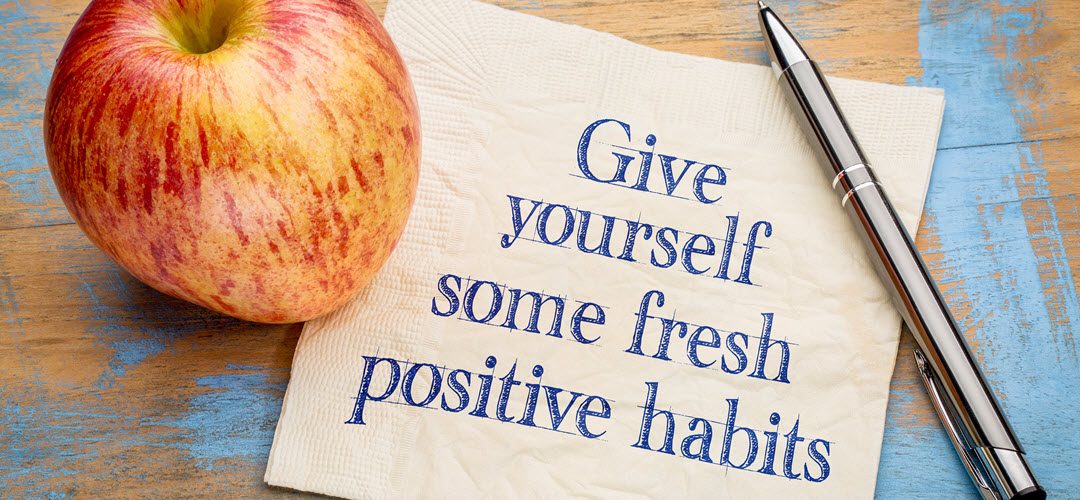
Succeed making a new habit!
We’ve all experienced it. Cleared the piles of paper off the kitchen counter and vowed to not let them accumulate again, but here they are. Told the dentist that, yes, we would start flossing more, but we haven’t. Told our therapist we’d cut back on the night-time emotional snacking we do, but we’re really having trouble with that one. And of course, exercise. Yeah, you probably know how that one goes, especially after the New Year. If these aren’t your weaknesses, think about what is. I’m sure you have an area of struggle. We all do!
Why is creating a new habit so hard when we feel so sure and committed to our intention?
Several things can be obstacles for us: goals that are unrealistic or too vague, habits that are not rewarding enough to perform or the gratification is too delayed, we’re uncomfortable with the structure the habit imposes, we’re derailed by interruptions, or our perfectionism undermines us. Additionally, we may feel too overwhelmed with our responsibilities to try to change, our mood isn’t oriented to the process (i.e., angry, sad, fearful, hopeless), or we have no support or accountability.
Researchers and psychologists in the field such as George Koob, Ph.D., B.J. Fogg, Ph.D., and Kim Kensington, Psy.D. agree that we need to do the following:
- identify small, achievable goals
- reduce our reliance on willpower
- reward success until the habit is done consistently.
So how do we do this?
- Prioritize the use of your time and pick a habit you want to add. Think about how much time this habit will take so you can decide where in your day/week it best fits. Break it down to its smallest first step. That’s where you’ll start. Determine if you’ll need any supplies/materials or other preparation.Our example will be cleaning house one room each day Monday-Friday.
- Choose what’s called an ‘anchor.’ This is what will come just before the habit behavior. In our example of cleaning, the ‘anchor’ is the kids leaving for school.There could be more than one small first step we could choose, like dusting or tidying up a room, but the “smallest” step is just sitting in a room for 5 min. (This is the “tiny habit” advocated by B.J. Fogg, PhD., who runs an online project of the same name. You can sign up and identify 3 tiny habits you’d like to change, and for 5 days you can practice and do an online check-in with him.)This starts to build the habit by carving out the time to dedicate to this activity right after the kids leave, but it certainly doesn’t feel very rewarding so we probably won’t continue without building in a reward.
- It’s rewarding to imagine how our lives would be different if we were fully implementing our habit (why we chose it in the first place as a priority), turning on some favorite music while we sit (and later – clean), and/or place the reward after the behavior. We could sit and have a cup of coffee or talk to a friend.
- If remembering to take the 5 minutes to sit in the designated room is a problem, put a reminder on what’s called the “point of performance,” meaning right where it matters. That could be an alert on your phone at the right time, a post-it on the inside of the front door where the kids exit, etc.
- We mentioned setting realistic goals. That means starting out trying to start this habit 1 day a week, not 5. When we’re getting 1 day pretty consistently, then add 2, 3, etc.
 And what happens when a day is missed? We just do the next one and keep on going. It isn’t to be a source of self-hatred or shame. Life happens. The best we can do is just pick it back up, starting over smaller if needed, and recreate our habit using the same process we had in place.
And what happens when a day is missed? We just do the next one and keep on going. It isn’t to be a source of self-hatred or shame. Life happens. The best we can do is just pick it back up, starting over smaller if needed, and recreate our habit using the same process we had in place.
There really is no magic number of days it takes to build a habit (21 days, 30 days, etc). It depends on the complexity and demands of the habit, how different the habit is from our usual behavior, whether any other people or variables out of our control have any influence over our performance of the habit behavior, etc.
If you start small, with clear and realistic goals in mind, build consistency, and ideally stay accountable to someone else, you can do it!
